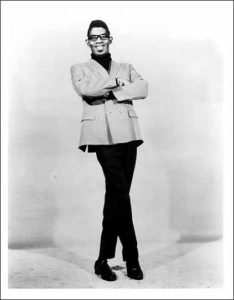If Richard Berry had only done that one thing in his life it would have been more than enough. What is that one thing? Well in 1955 Mr. Berry wrote a little song called “Louie Louie” and two years later he recorded it with his group, the Pharaohs. It was released by Flip Records as a B-side to Berry’s cover of “You Are My Sunshine.” It was a hit, albeit a minor one, regionally, selling 130,000 copies.
Obviously, Berry’s song has a history that has lived on far beyond that original recording. In fact, it lives on to this day. But let’s talk about the composer before we get back to the song. Berry was born near Monroe, Louisiana but brought up from the time he was a baby in Los Angeles. He badly injured a hip as a child and was on crutches until he was six. While at a summer camp for crippled children Berry took up his first instrument, the ukulele.
At Jefferson High School, Berry harmonized in the hallways along with many other students, and that led to him recording with a number of doo-wop groups including the Penguins, the Cadets, the Chimes, the Crowns, and several others. He eventually landed in the Flairs in 1953, and sang bass on their single, “She Wants to Rock,” which was produced by none other than Lieber and Stoller, and released on Modern Records.
It wasn’t much later when Lieber and Stoller were recording the Robins and needed a bass voice for their “Riot in Cell Block #9.” They remembered Berry, and although uncredited (because he was under contract with Modern), that’s Berry singing on the ominous introduction to the hit, which was released on Spark Records. That wasn’t the last hit that Berry, uncredited, sang on. That’s him on Etta James’ first hit “Wallflower (Dance With Me, Henry).” He sang with several other groups including the Arthur Lee Maye and the Crowns, and a group called the Dreamers, who eventually became the Blossoms.

By 1954, Berry was done with the Flairs. He formed his own group which he called the Pharaohs. But in between the Flairs and the Pharaohs Berry worked with a group called Rick Rillera and the Rhythm Rockers. Inspired by the Latin rhythms of their song “El Loco Cha Cha,” and not a little bit by Chuck Berry’s “Havana Moon,” Berry began work on a new song. He wrote down the lyrics, inspired by Sinatra’s “One for My Baby” according to Berry, on a piece of toilet paper before a show one night.
It took six years, and the controversy of an FBI investigation into the song’s lyrics, until “Louie Louie” became a huge hit. Alas, it wasn’t Berry’s version that struck gold, but one by a group called the Kingsmen. Worse yet, Berry had sold the copyright back in 1959 for $750 because he needed the money to pay for his wedding. So although “Louie Louie” has been recorded over 1,000 times, Berry has seen very little of the money.
“Everybody sold their songs in those days,” Berry said in 1993. “I never was bitter with the record companies. They provided a vehicle for five young black dudes to make a record.”
Berry didn’t stop writing songs however and one of them, “Have Love, Will Travel,” became a regional hit for the Sonics and has inspired a number of cover versions including one by the Black Keys in 2003.
By the mid-1980s Berry was living on welfare in his mother’s house in Los Angeles. When a company called California Cooler wanted to use “Louie Louie” in a commercial and needed Berry’s approval to do so. The company located Berry and sent a lawyer to see him. The lawyer convinced Berry that he could win back the rights to the song that he had sold so long ago. Berry went to court and the settlement made Berry, at long last, a millionaire.
Berry continued to play shows into the ’90s, even reuniting with his Pharaohs in 1996 for a benefit concert in L.A. Unfortunately his health began to decline around that time and he passed away the following year at the age of 62.
“Louie Louie” is the most recorded song in rock history. The Rock and Roll Hall of Fame called it one of the 500 Songs that Shaped Rock and Roll, and the song entered the Grammy Hall of Fame in 1999. In addition to the countless honors and widespread recognition, Richard Berry’s birthday, April 11, is now celebrated as International Louie Louie Day.





Comments